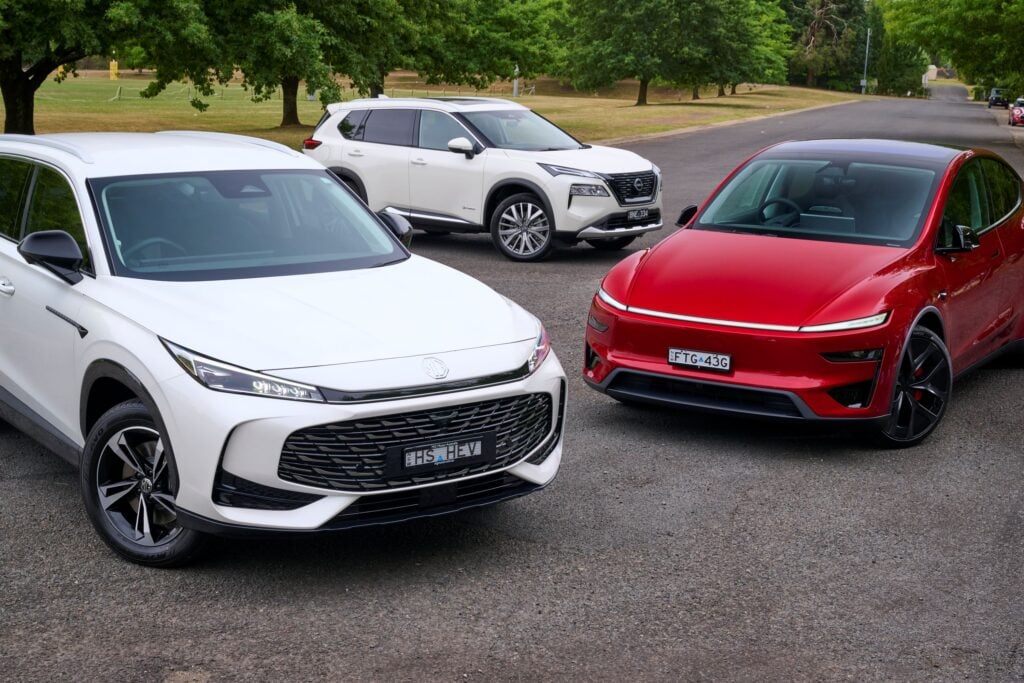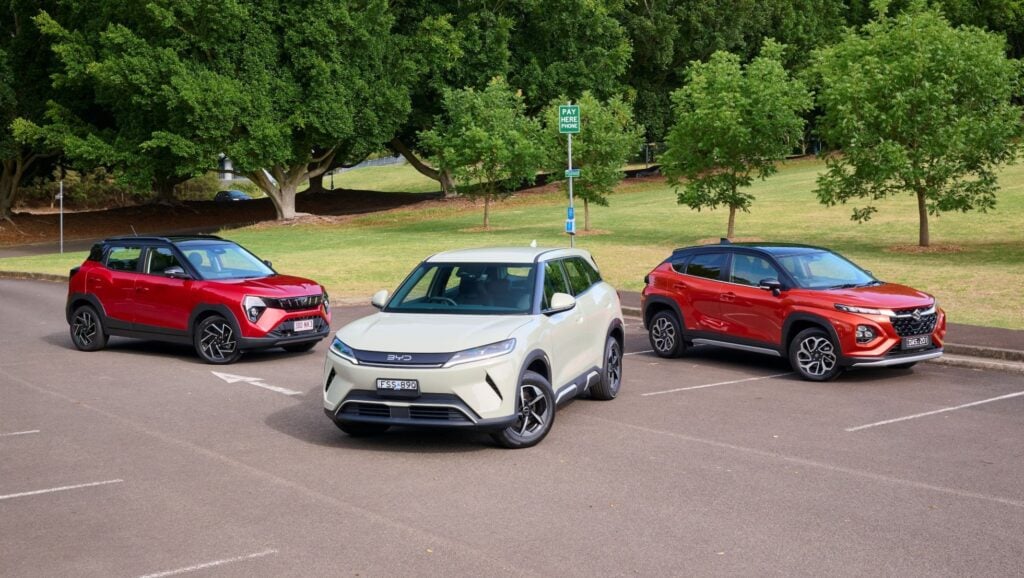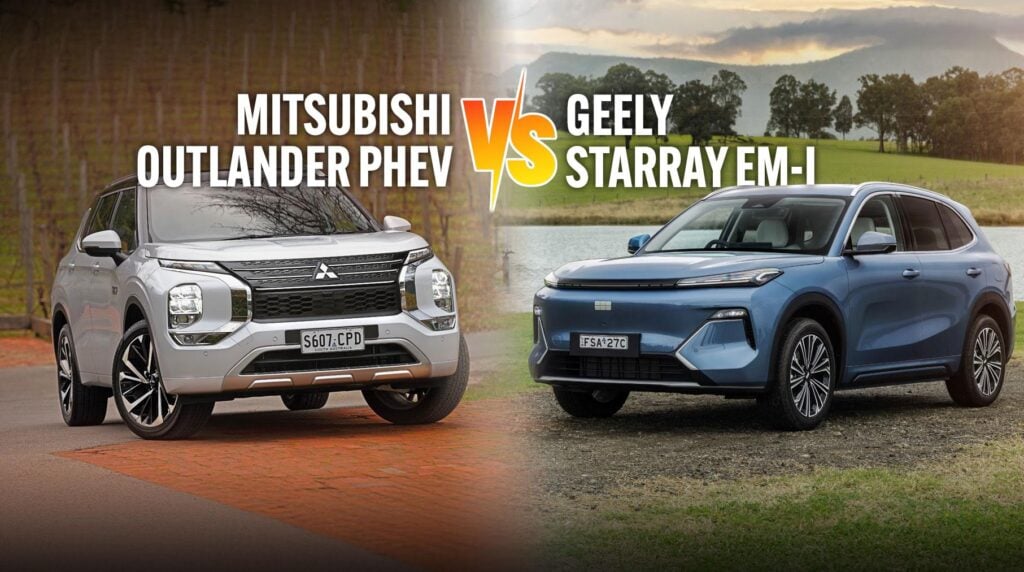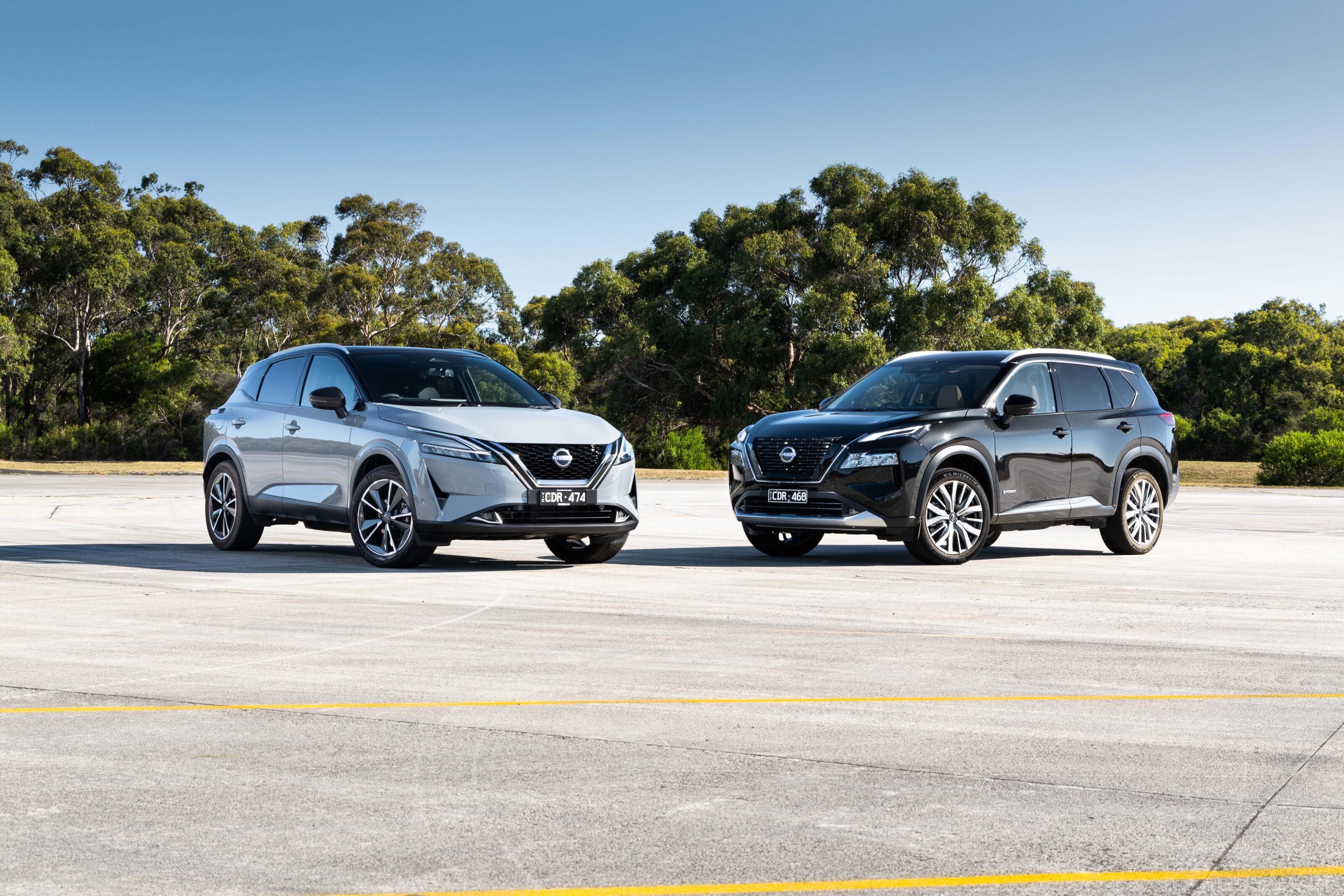
Things we like
- QASHQAI: Luxe interior for the money
- X-TRAIL: All the space you could ever need
Not so much
- QASHQAI: Ride quality could be better
- X-TRAIL: E-Power economy disappointing
Seeing these two together, it seems crazy to think of the Qashqai as a small SUV, but it is markedly smaller than the mid-sized X-Trail.
How do they compare as buying options? Let’s find out.
? The original Nissan X-Trail ad from 2004 was something of a TV classic.
“There are sports,” came the voiceover as it poked fun at horseshoe throwing and pogo-sticking, “and there are extreme sports”, as images of snowboards and dirtbikes flashed up.
Nissan’s positioning of the X-Trail as the ‘only extreme compact SUV’ – kicking a bit of dust in the then-dominant Subaru Forester’s face – helped make it a sales success and super-heat a new SUV trend that continues today. By the end of 2005, the X-Trail had stolen thousands of Forester sales from Subaru as Toyota readied its new RAV4.
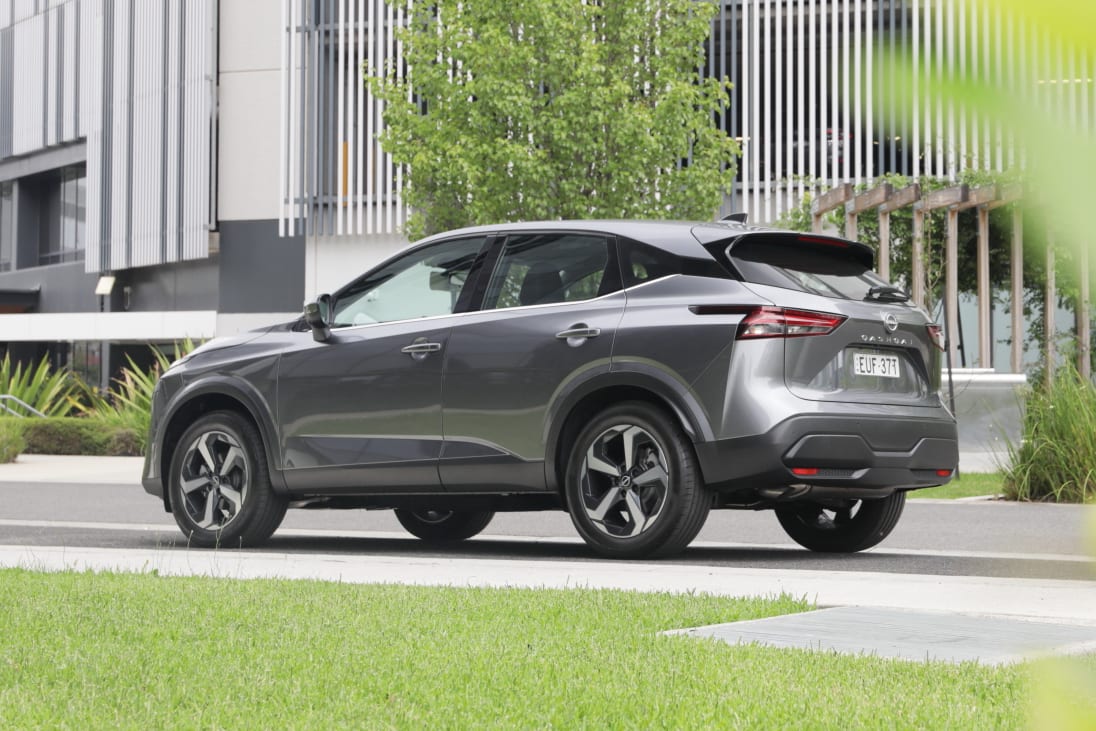
In 2023, the fourth-generation X-Trail is a very different beast to the original and is almost as big as a 2004 Nissan Patrol. Meanwhile, its contemporary baby SUV brother, the compact third-generation Qashqai, is almost as big as the original X-Trail.
With both cars built on the Renault-Nissan-Mitsubishi Alliance CMF-C platform, it’s easy to walk into a Nissan showroom in 2023 and have no clue which one to get. This article aims to solve that.
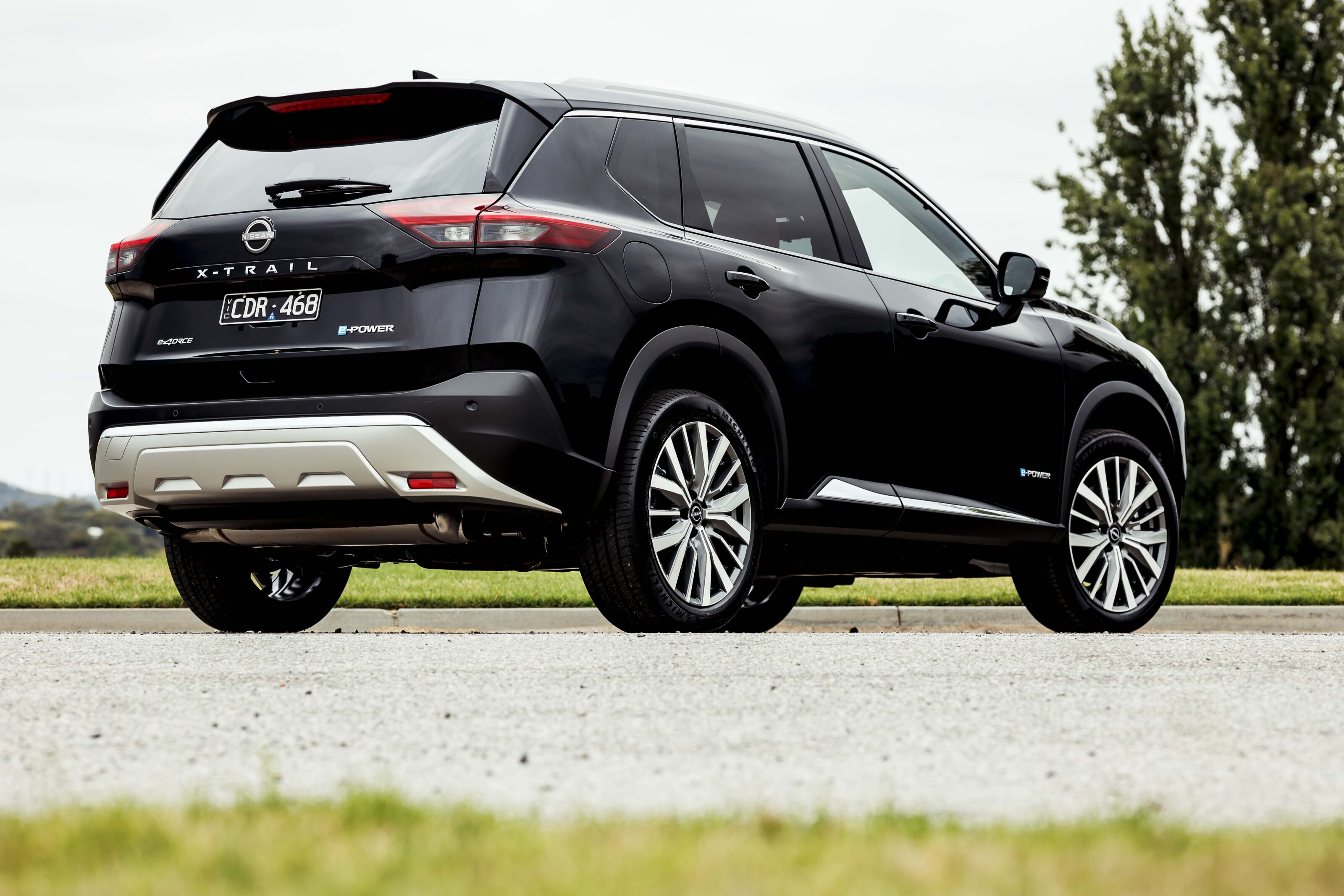
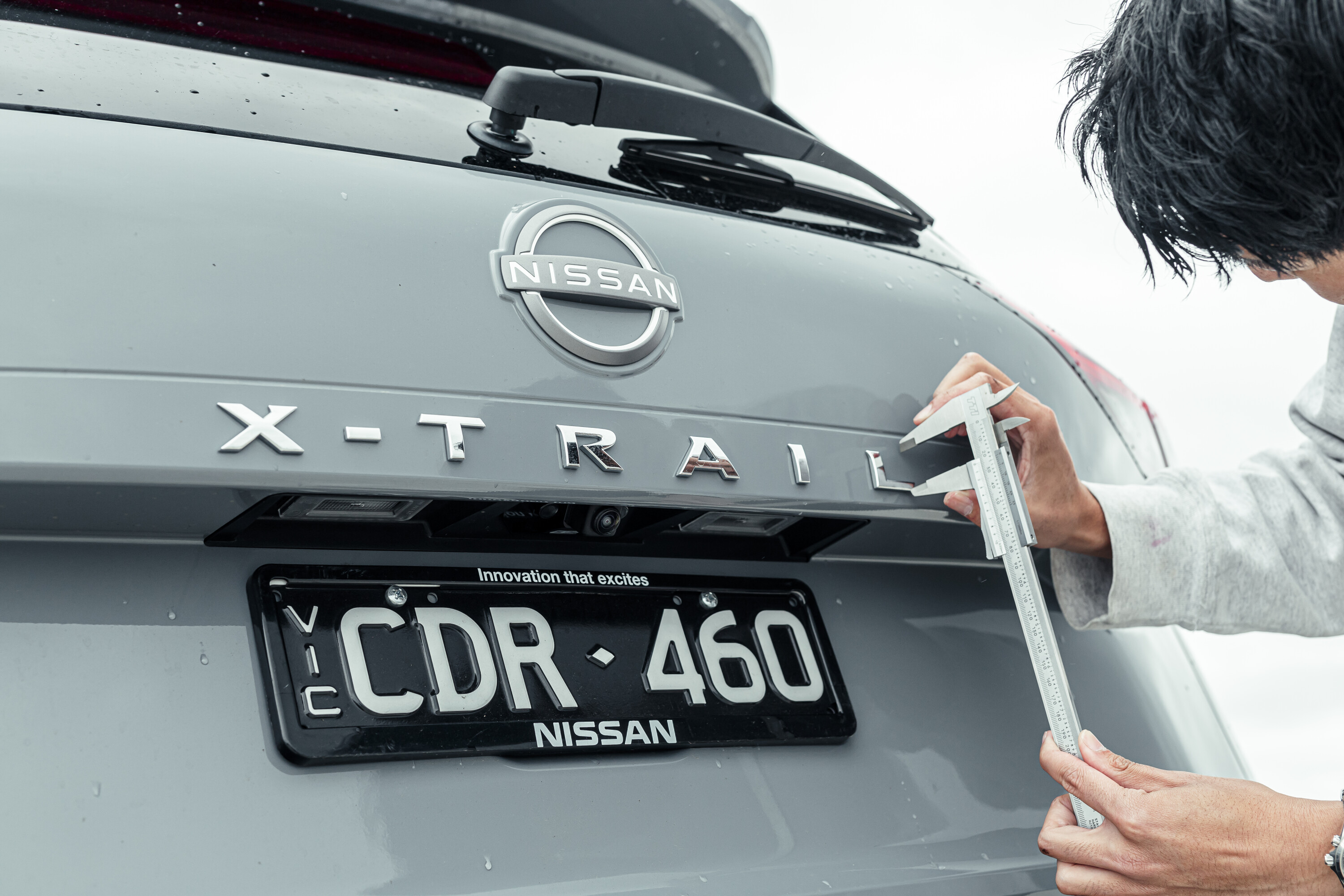
JUMP AHEAD
Pricing and features
The Qashqai is available in front-drive only, with a 110kW 1.3-litre turbo-petrol inline-four.
The X-Trail comes in both front- and all-wheel drive, with two powertrains: a naturally aspirated 2.5-litre four-cylinder, and the quirky E-Power petrol-electric hybrid.
In E-Power guise, the X-Trail is propelled solely by two electric motors – just like an electric car. There’s one front, one rear, giving it all-wheel drive. However, unlike an electric car, instead of a huge battery it has a tiny 2.1kWh pack constantly recharged by a small petrol engine under the bonnet.
Which is which?!
A note on these interiors: the tan & black trim is the X-Trail, leaving the Qashqai with black-on-black.
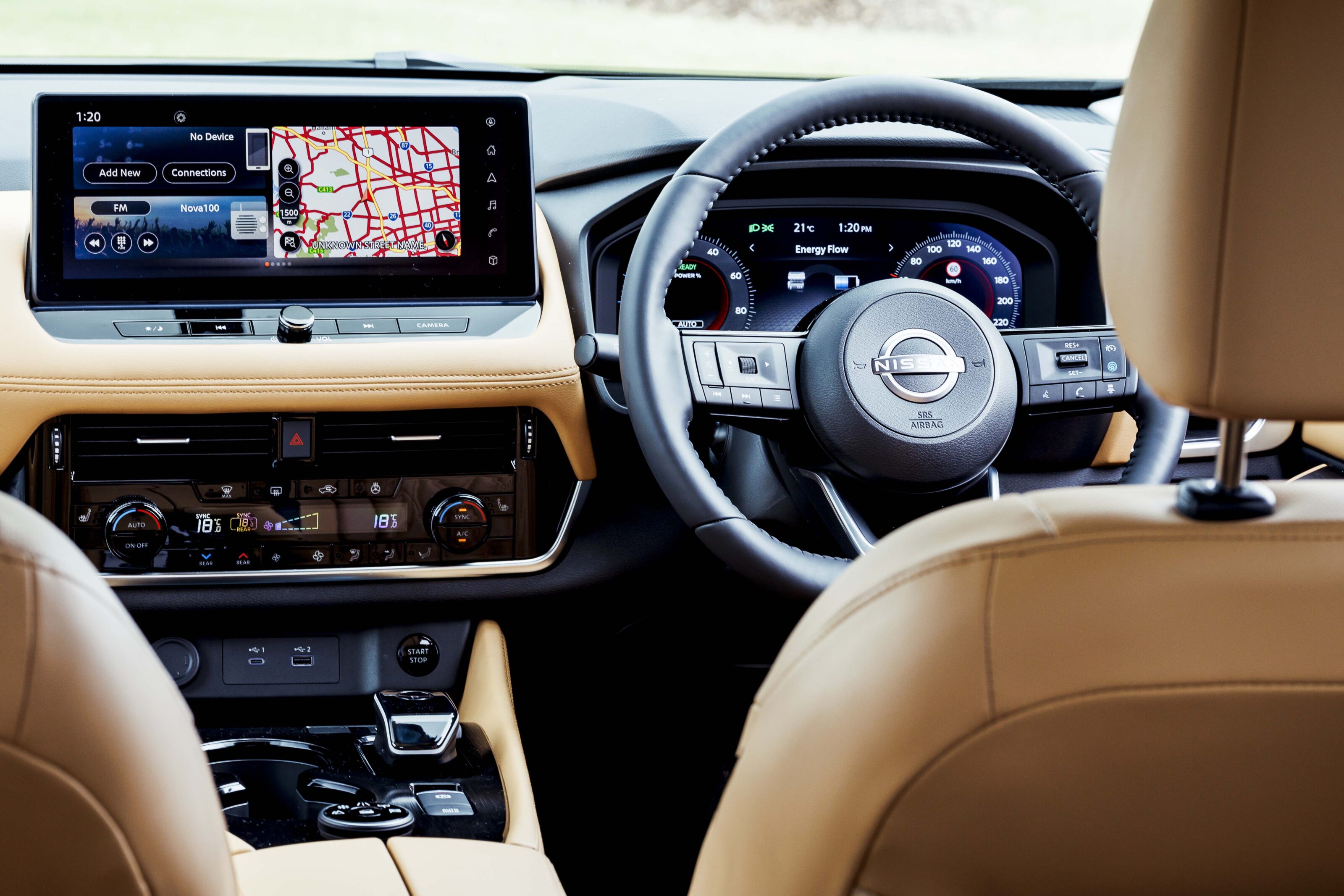
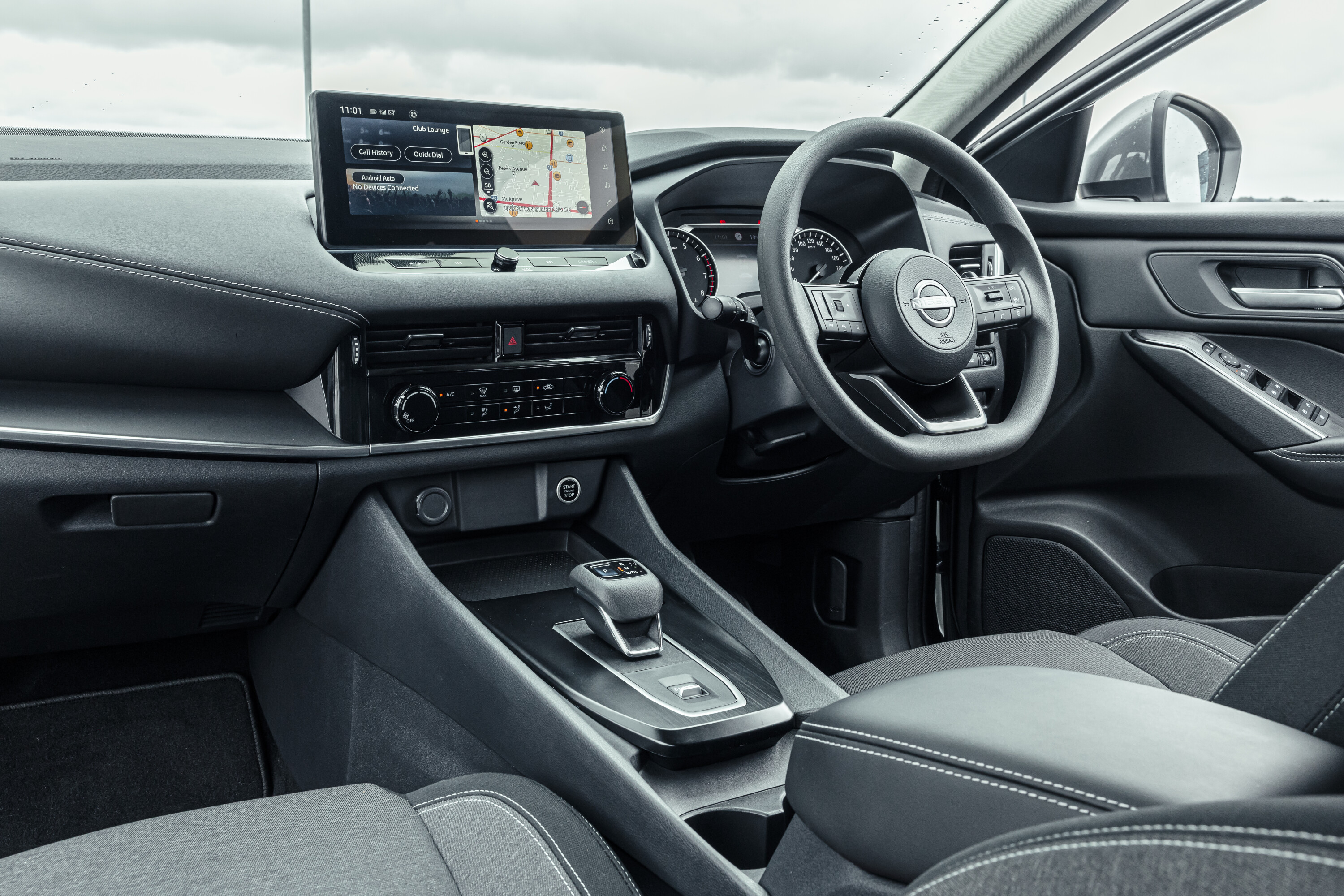
In the X-Trail’s case, that’s a 1.5-litre three-cylinder turbo, not connected to the wheels in any way. It’s purely a generator. This helps keep the X-Trail E-Power’s price down, compared to an electric car. A Qashqai E-Power is due in Australia later in 2023 (see our review here), claiming around 5.3L/100km and expected to attract a $3000-$4000 premium.
The Qashqai range kicks off at $33,890 for the base ST and tops out at $47,390 for the richly-specced Ti. Meanwhile, the larger X-Trail range starts at $36,750 for the front-drive ST and extends all the way to $57,190 for the luxurious Ti-L E-Power all-wheel drive (all before on-road costs).
Both cars bristle with standard features no matter the variant – though of course, as you spend more, you get more.
Nissan designers and engineers have brought desirable new features to the Qashqai and X-Trail once reserved for luxury European cars.
This includes things like massage seats, a head-up display, an electric opening and closing tailgate and 10-speaker Bose audio systems – but to get this stuff, you need to shell out for pricier Ti variants.
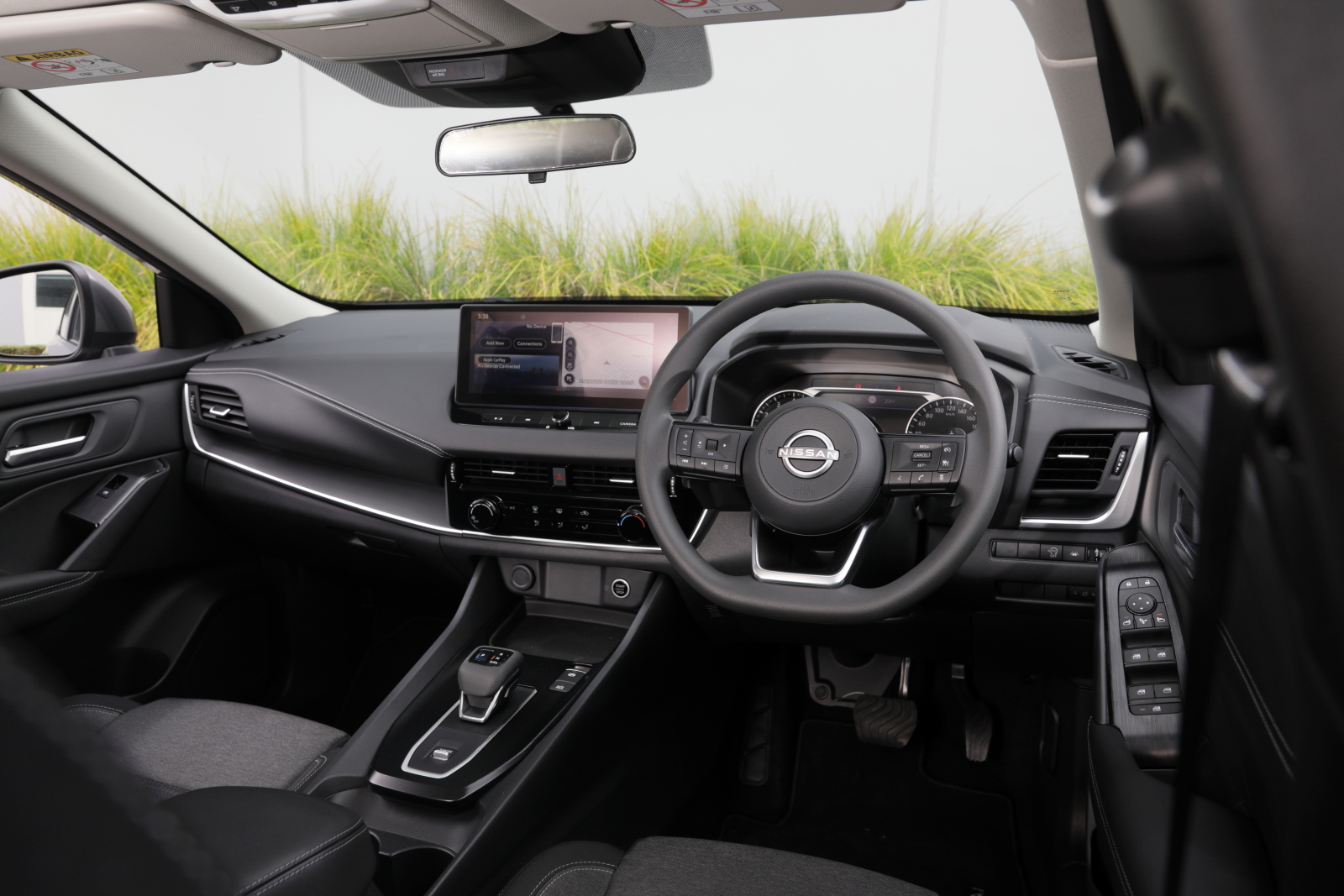
And a base $33,890 Qashqai ST – with its cloth, manually-adjustable seats and 8.0-inch central touchscreen – feels very different to the top-spec $47,390 Ti with its leather upholstery, 10-way electrically adjustable front seats and 12.3-inch central touchscreen. Likewise, a base $36,750 X-Trail ST is a very different beast to the $52,990 Ti-L.
Base Qashqai and X-Trails offer smallish, 8.0-inch central touchscreen displays – although in something of a standout move, the $37,890 Qashqai ST+ boosts that to a much nicer (and equal class-leading) 12.3 inches.
To get the same-size centre display in an X-Trail, you need to shell out a minimum of $49,990 for the Ti. Likewise, the ST+ gets wireless Apple CarPlay but the X-Trail doesn’t offer that until Ti. Again, all the above prices are before on-road costs.
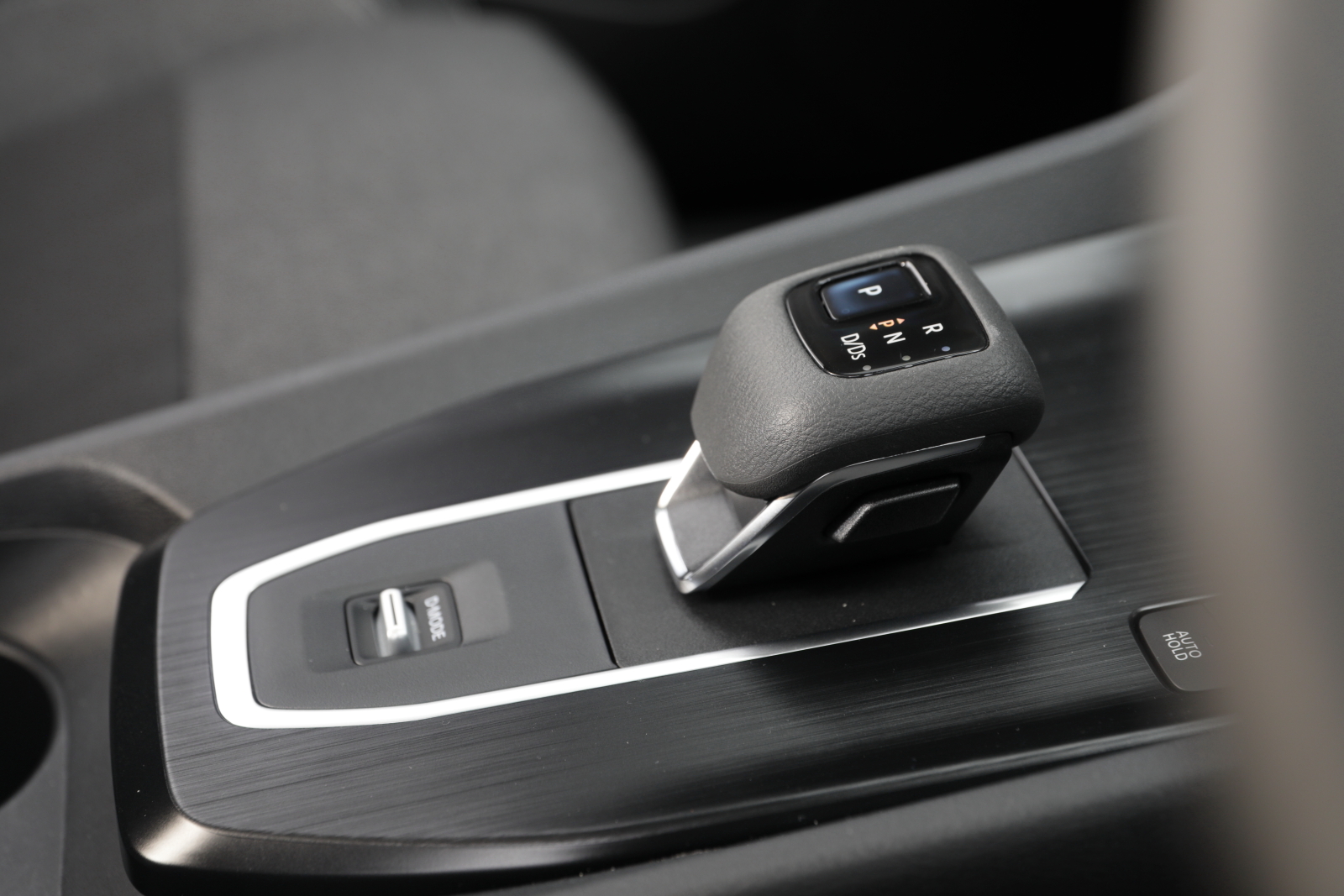
At times, both are remarkably close on price – but don’t let the variant names fool you, as a Qashqai ST-L, for example, is more richly specced than an X-Trail ST-L.
The Qashqai ST-L is $42,190 before on-road costs and while you can get an X-Trail ST-L for just $1000 more, the Qashqai has bigger wheels (19s versus 18s), a bigger central touchscreen (12.3-inch versus 8.0), wireless Apple CarPlay (to the X-Trail ST-L’s wired), wireless phone charger, adaptive LED auto-levelling headlights and heated steering wheel. An X-Trail ST-L doesn’t have any of this.
For standard equipment, Qashqai Ti is more comparable to the X-Trail Ti-L.
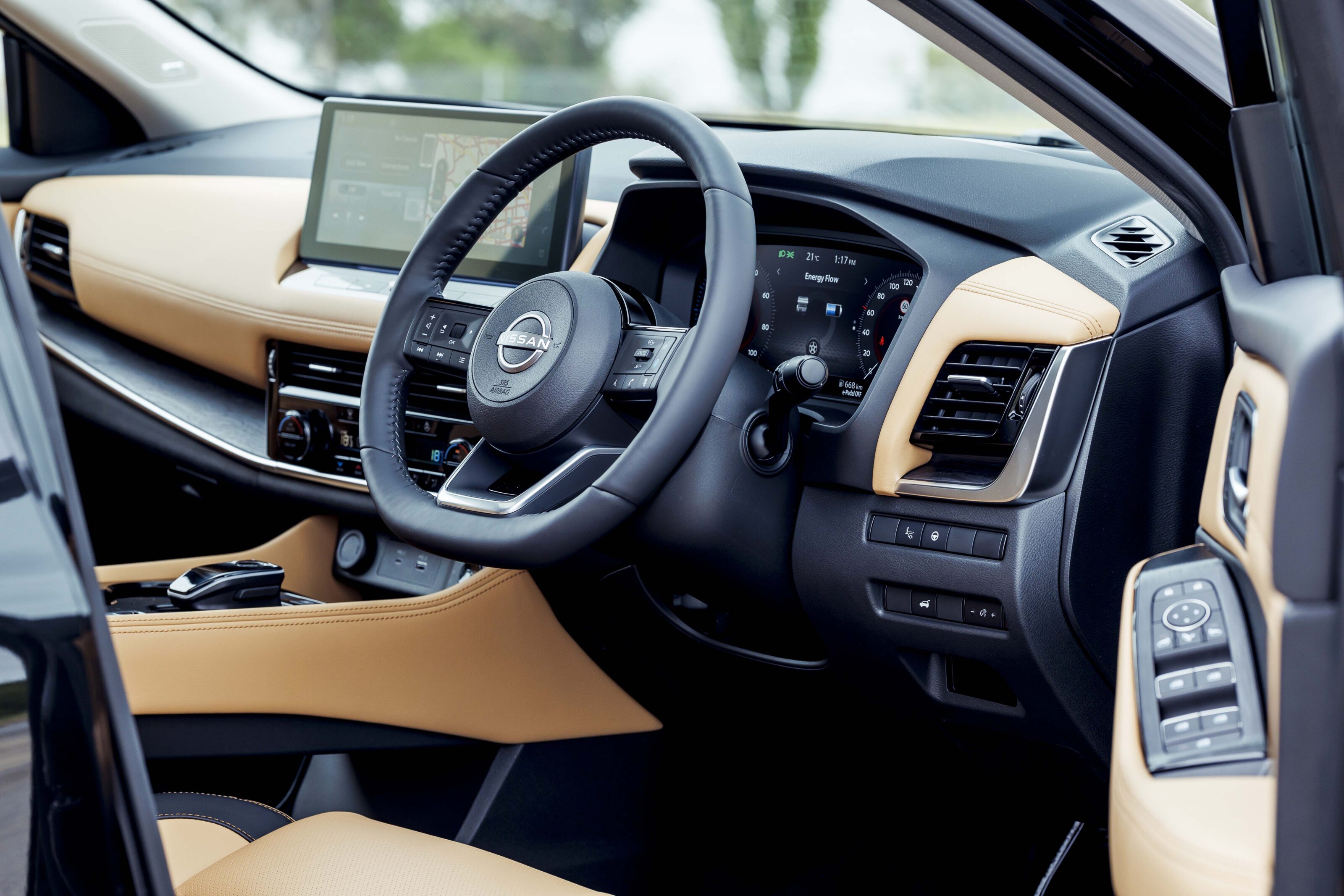
| MY23 Nissan Qashqai pricing (MSRP, excluding on-road costs) | |
|---|---|
| ST | $33,890 |
| ST+ | $37,890 |
| ST+ with two-tone paint | $38,390 |
| ST-L | $42,190 |
| ST-L with two-tone paint | $42,690 |
| Ti | $47,390 |
| Ti with two-tone paint | $47,890 |
| MY23 Nissan X-Trail pricing (MSRP, excluding on-road costs) | |
|---|---|
| ST 2WD | $36,750 |
| ST AWD 7-seat | $39,790 |
| ST-L 2WD | $43,190 |
| ST-L AWD 7-seat | $46,290 |
| Ti AWD | $49,990 |
| Ti-L AWD | $52,990 |
| Ti E-Power | $54,190 |
| Ti-L E-Power | $57,190 |
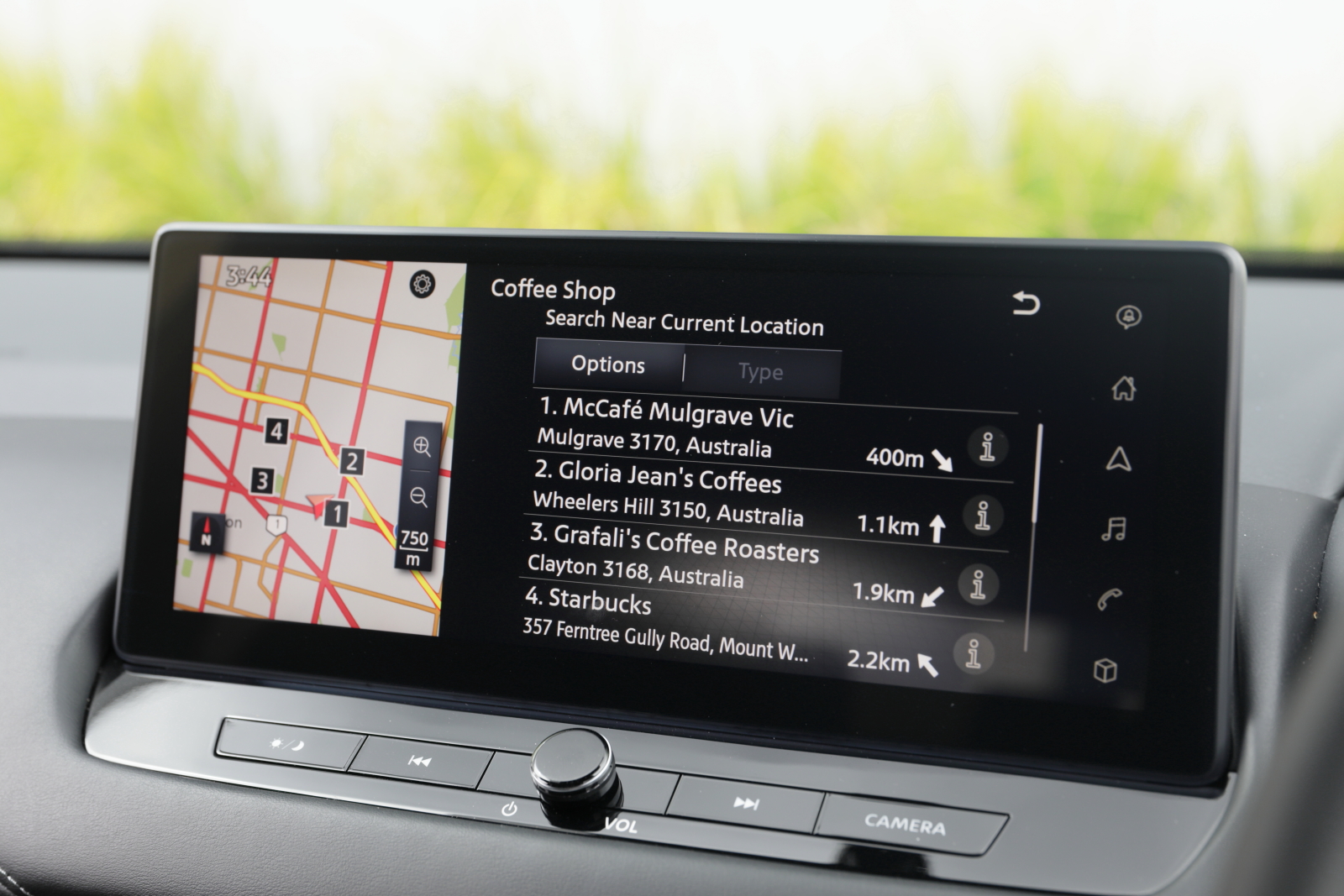
Comfort and space
Both cars are lovely places to sit – especially as you work your way up the grades and add more features, bigger screens and more leather.
The top-spec Ti grade Qashqai and X-Trail, with their diamond-quilted Nappa leather seats, almost feel Lexus-like for their interior ambience and quality. If you haven’t sat in a Nissan interior since 2005, you’ll be blown away.
Our X-Trail Ti-L E-Power test car had curious tan and black interior trim that reminded us of modern Ferraris. Took a bit of getting used to, but we liked it. An all-black trim is available.
In the Qashqai’s case, rear seat space is surprisingly good for a compact SUV, although obviously, the X-Trail is simply the larger car. Space for front occupants is subtly larger, making for a roomier experience. And its boot alone is almost 30 per cent bigger than you get in a Qashqai.
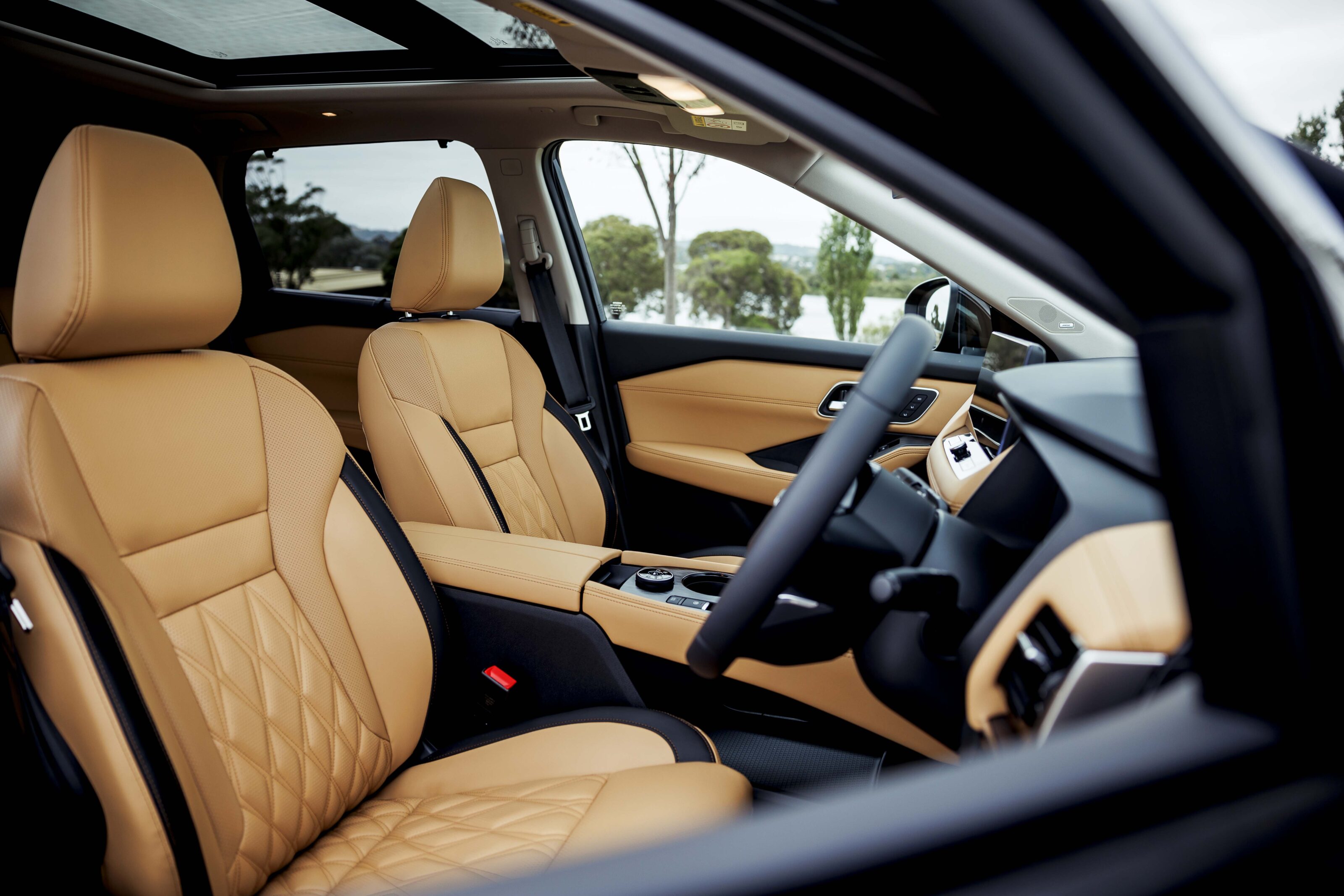
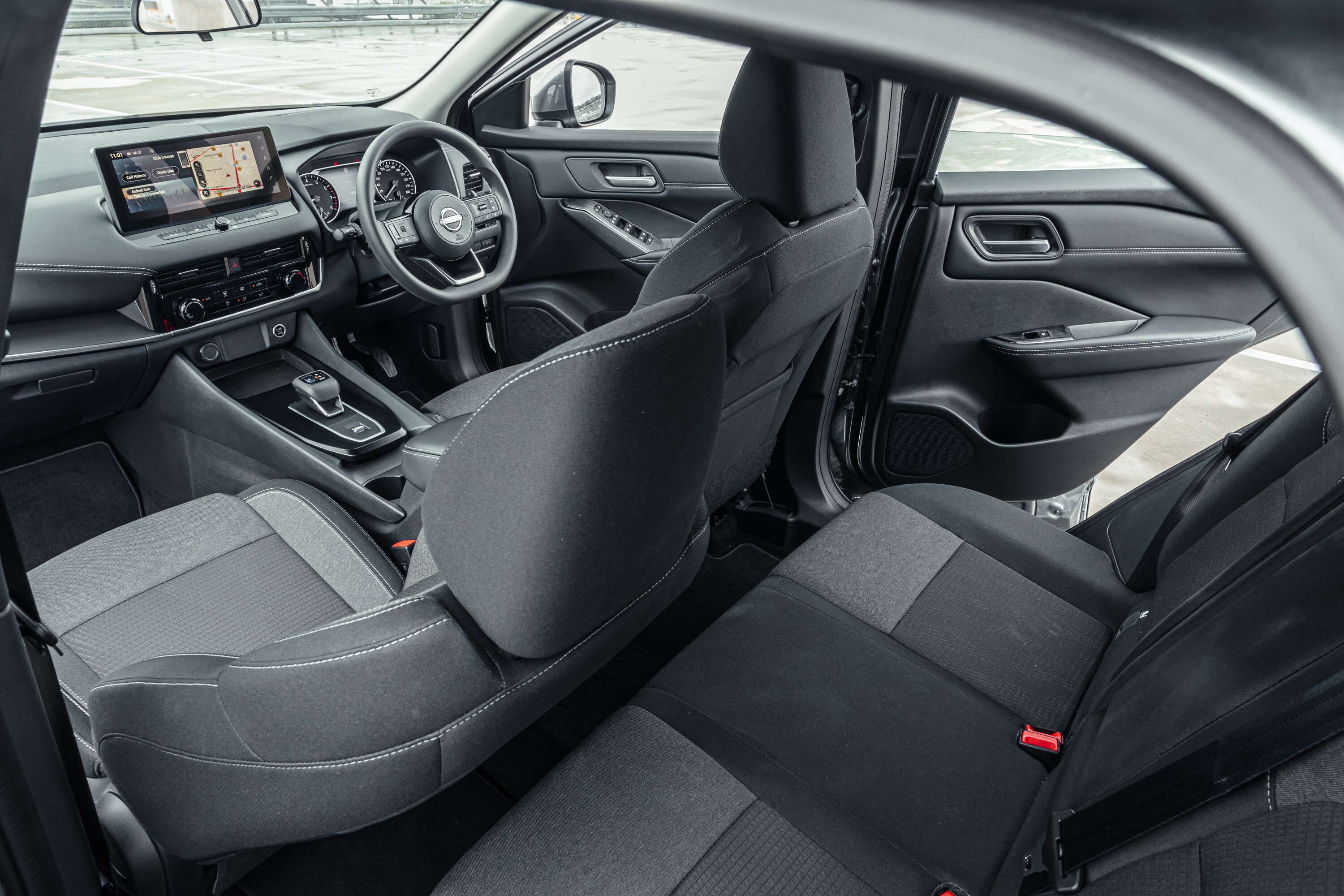
The X-Trail interior is full of thoughtful design touches such as the barn-door opening centre console and the lovely, carpet-lined door bins.
Countless clever bins and compartments maximise interior storage space – you can never have too many nooks or crannies.
One underrated feature of both Qashqai and X-Trail – that might just sell a few cars all on its own – are clever rear doors opening generously to almost 90 degrees, allowing very easy access to the rear seats.
Only the X-Trail can offer seven seats, and it’s cosy back there, only really suitable for small children – or, if adults, very short and uncomfortable trips. Owning a seven-seater, even if you never use the third row, does grant a certain peace of mind.
Both cars have two ISOFIX child restraint anchors on both the outboard rear seats.
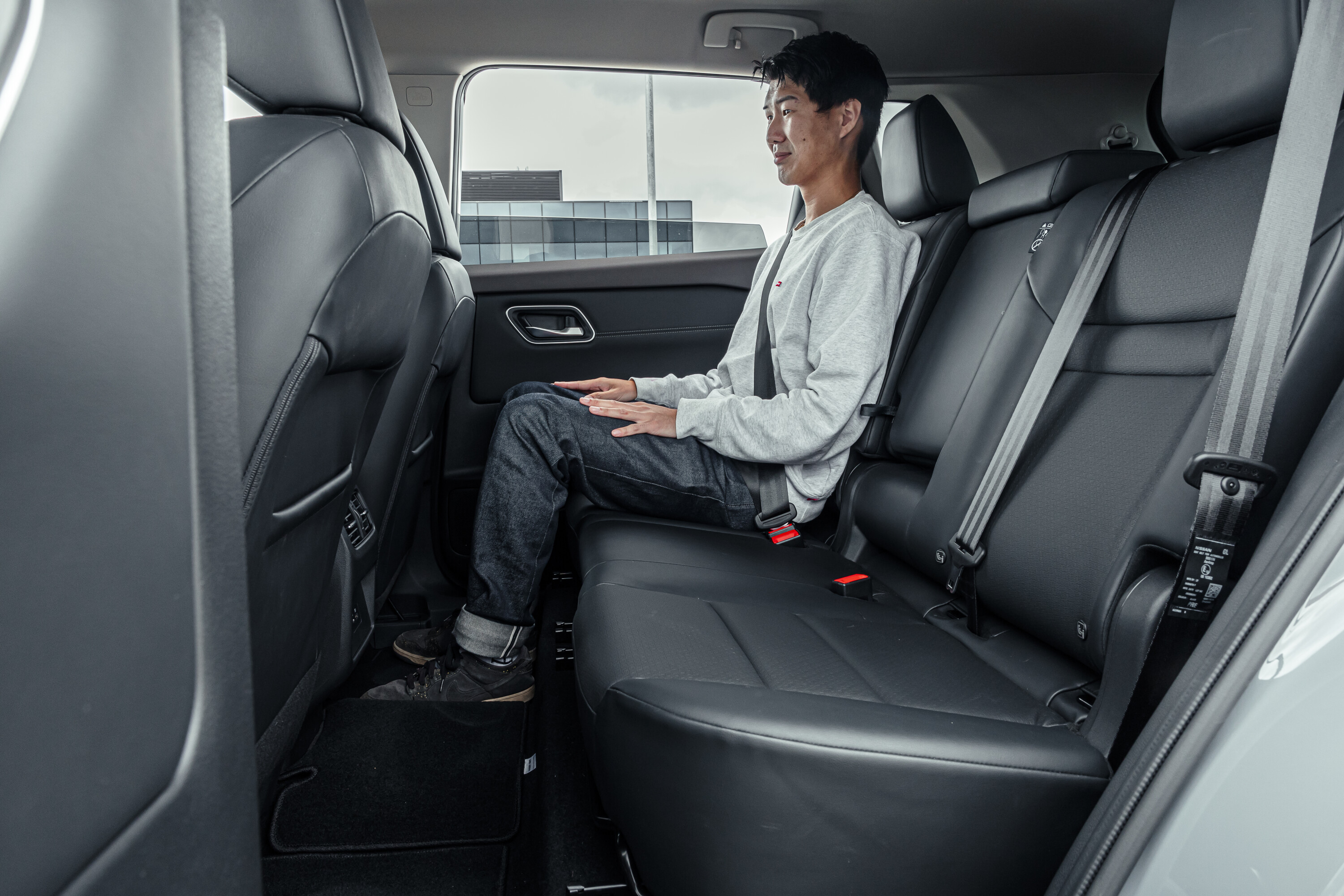
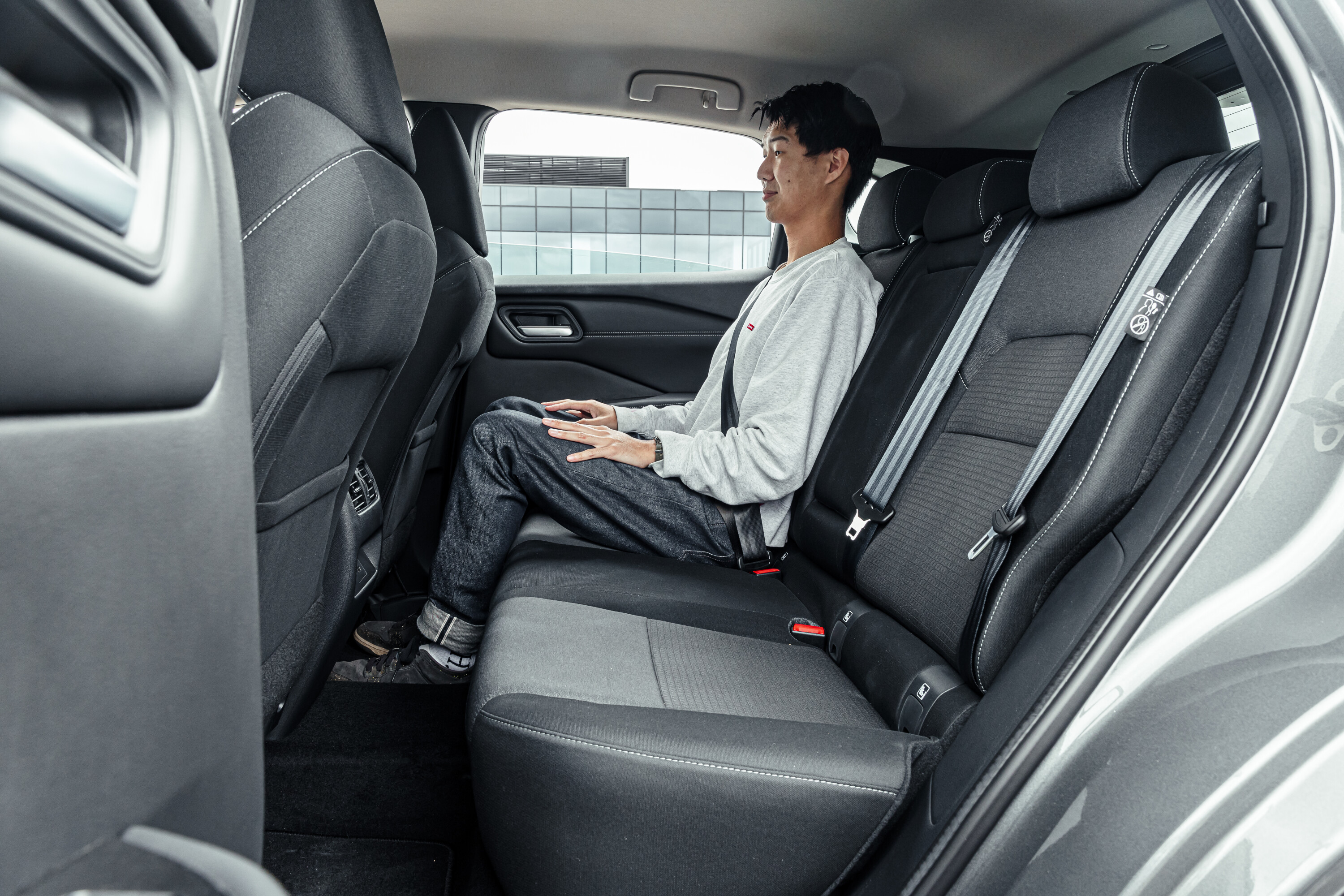
MINI MATCH-UP
| u00a0 | Qashqai ST+ | X-Trail ST-L 7-Seat | Difference |
|---|---|---|---|
| Length | 4425mm | 4680mm | +255mm |
| Width | 2084mm | 2065mm | -19mm |
| Height | 1625mm | 1725mm | +100mm |
| Wheelbase | 2665mm | 2705mm | +40mm |
| Head room (front/rear) | 997/983mm | 1050/1000mm | +53/+17mm |
| Leg room (front/rear) | 1072/860mm | 1095/892mm | +23/+32mm |
| Shoulder room (front/rear) | 1436/1415mm | 1451/1422mm | +15/+7mm |
| Hip room (front/rear) | 1362/1335mm | 1374/1274mm | +12/-61mm |
| Boot size | 429 litres | 585 litres | +156 litres |
| Cargo space (rear seats folded down) | 1524 litres | N/A | N/A |
On the road
2023 Qashqai v X-Trail: The basics
| Nissan Qashqai ST+ | Nissan X-Trail ST-L 7 seater | Nissan X-Trail Ti-L E-Power | |
|---|---|---|---|
| Drive | front-wheel | all-wheel | all-wheel |
| Engine | 1.3-litre turbo-petrol 4-cylinder | 2.5-litre 4cyl petrol | 1.5-litre 3cyl turbo-petrol |
| Electric motors | N/A | N/A | 150kW (f); 100kW (r) |
| Power | 110kW @ 5500rpm | 135kW @ 6000rpm | 157kW |
| Torque | 250Nm @ 1600-3750rpm | 244Nm @ 3600rpm | N/A |
| Transmission | automatic, contioniously variable | automatic, contioniously variable | single-speed automatic |
| Weight | 1472kg | 1666kg | 1911kg |
| Tyres | Goodyear Eagle F1 235/55 R18 | Dunlop Grandtrek PT21 235/60 R18 | Michelin Primacy 4 255/45 R20 |
| Price | $37,890 (tested $38,590) + on-road costs | $46,290 + on-road costs | $57,190 + on-road costs |
The Qashqai is surprisingly fun to drive – agile, responsive and light on its feet.
Its chassis would make a good basis for a ‘hot’ performance SUV and is crying out for more power. The 110kW powertrain isn’t as peppy or energetic as the handling. The ride quality is also just okay, too; a little bit firm at times. A bit more comfort would be nice.
On the other hand, the X-Trail is a lovely vehicle to drive – nicer than the Qashqai. Like the first generation that wooed Australia, the all-wheel drive X-Trail is great on dirt, very stable, secure and fun.
The X-Trail impressed even more on the open road, with its quiet cabin, comfortable seats and well-judged suspension expertly combining comfort and handling, with a level of ride quality sophistication above that of the smaller Qashqai.
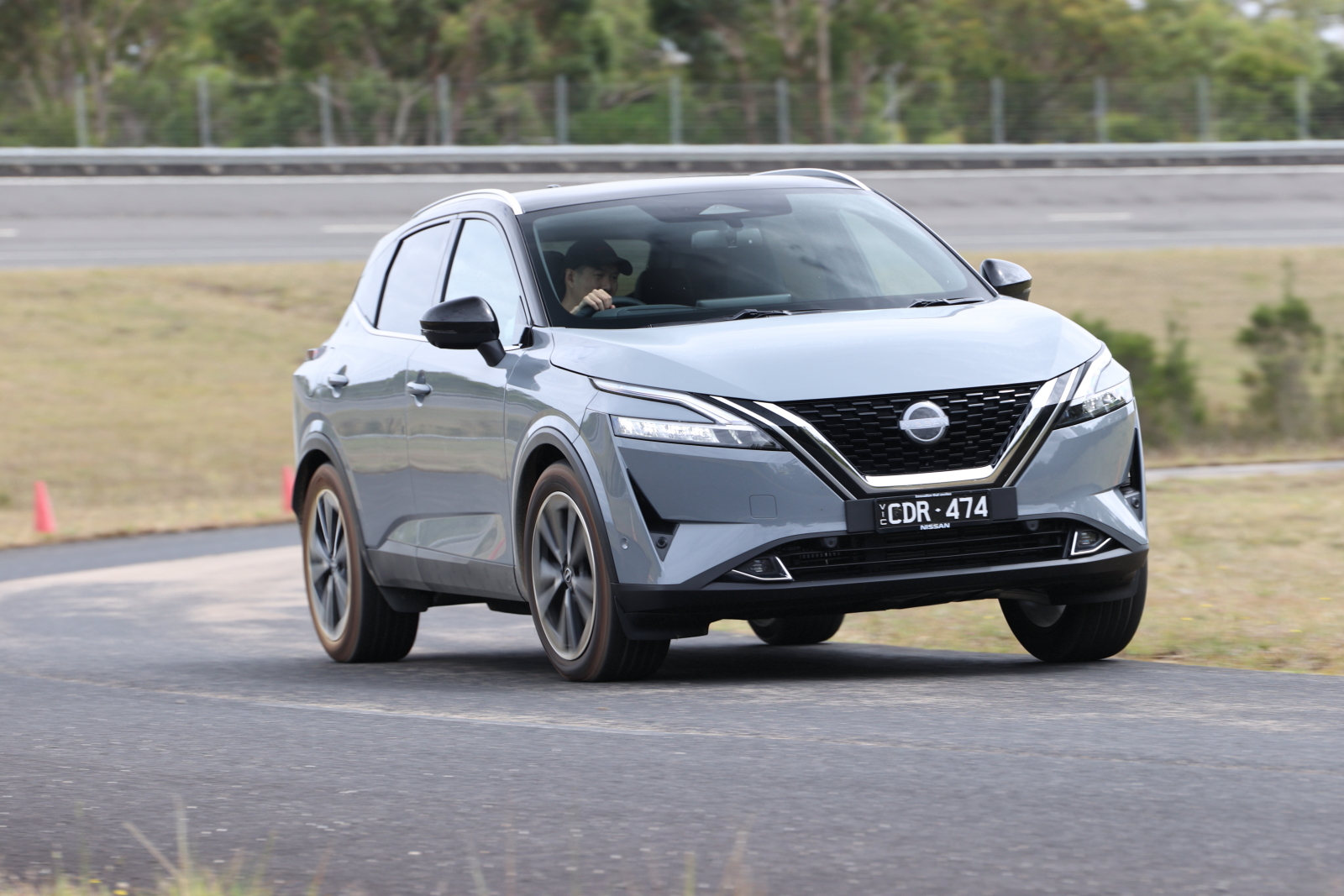
Opting for the E-Power drivetrain takes X-Trail refinement to a new level.
The smooth, silent electric motors imbue it with a luxury driving feel unlike any Nissan ever. It feels like an electric car, meaning buttery-smooth acceleration, instant and seamless switching between drive and reverse, and the punchy throttle response that only comes with electric motors.
The engine, when it kicks in, is impressively quiet – not that hearing it is a bad thing, as with three cylinders it makes a cool, off-beat kind of noise.
An external speaker on the E-Power broadcasts a curious noise at low speeds to warn pedestrians, given its near-silent operation.
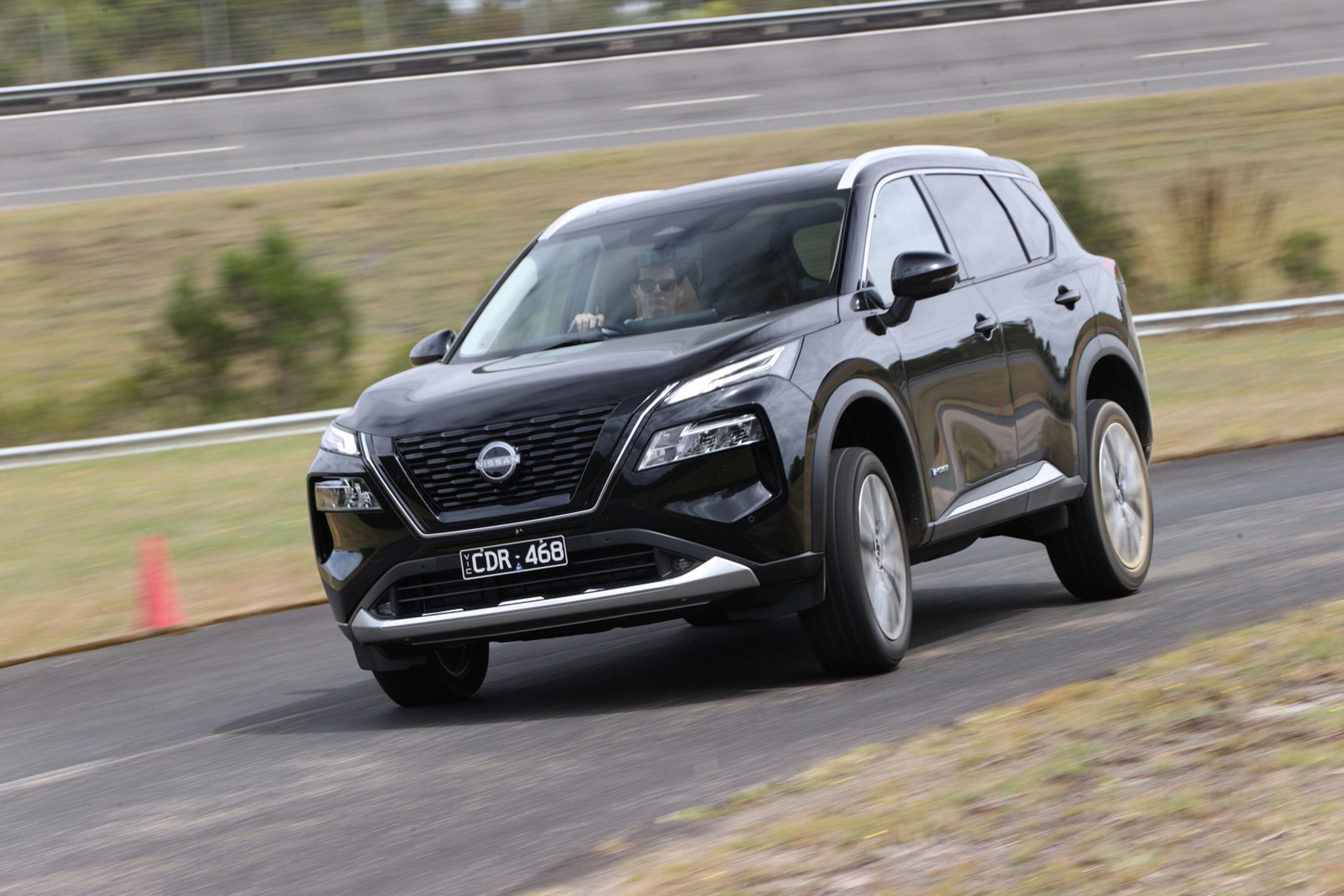
Based on first impressions of the E-Power system, silky-smooth and quiet electric motors will truly elevate the Nissan range once all its forgettable internal combustion engines and continuously variable transmissions (CVT) are phased out. That’s with maybe the exception of the Nissan Z and its tyre-frying twin-turbo V6.
Despite its raised 180mm ground clearance, we wouldn’t recommend taking a Qashqai any further off the beaten track than a dirt road. It’s only front-wheel drive and has no off-road modes.
The X-Trail, however, offers Snow and Off-Road modes in its all-wheel drive specifications and feels much more capable. The ST-L also has 205mm of ground clearance (the E-Power is 187mm).
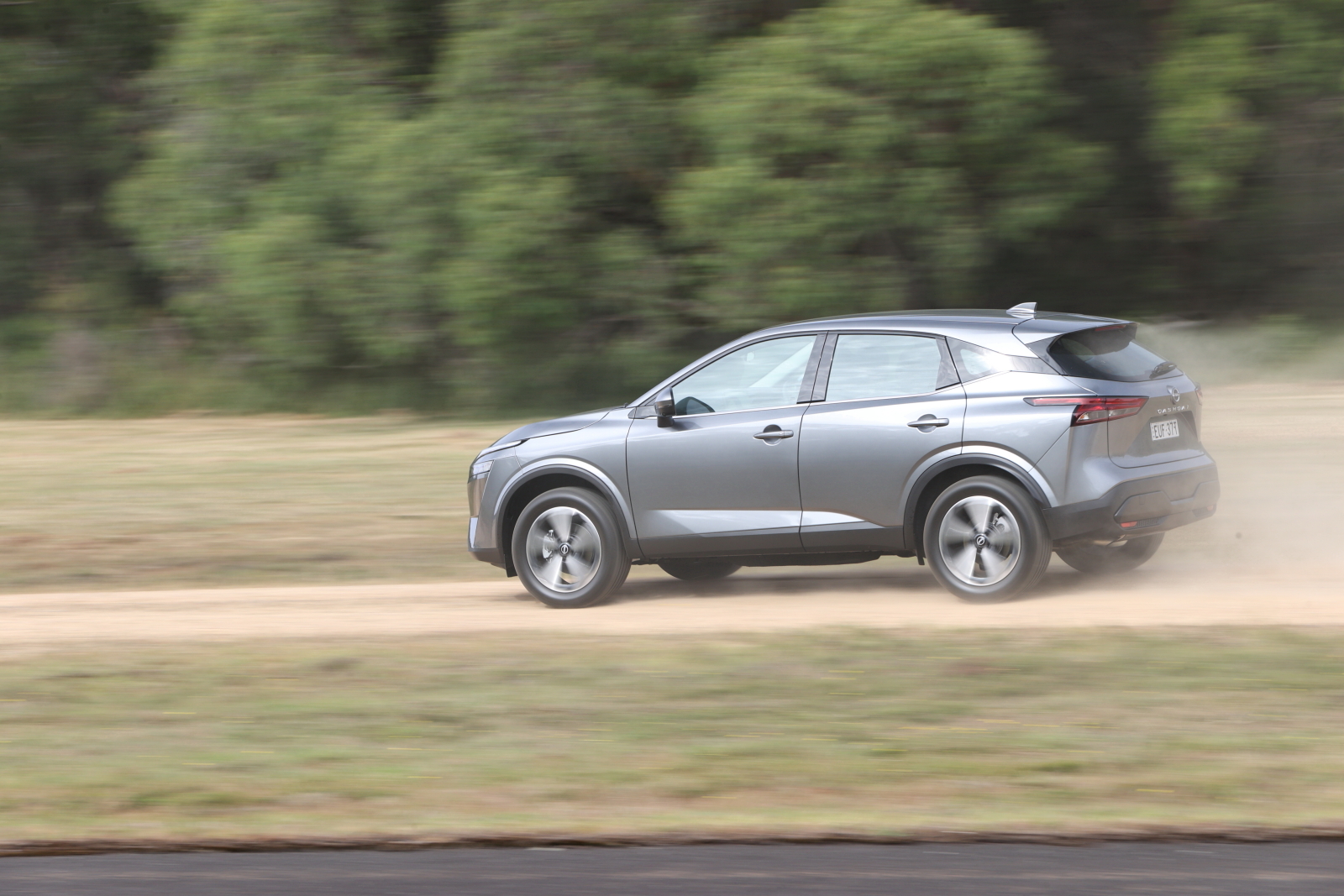
| u00a0 | Qashqai ST+ | Qashqai Ti | X-Trail ST-L 7-Seat | X-Trail Ti-L ePower |
|---|---|---|---|---|
| Power-to-weight | 75kW/tonne | 72kW/tonne | 81kW/tonne | 82kW/tonne |
| 0-100km/h (tested) | 9.6sec | 9.5sec | 9.2sec | 7.6sec |
| 100-0km/h (tested) | 35.9m | 36.4m | 40.9m | 36.7m |
| Lane-change maximum speed (tested) | ~95km/h | ~95km/h | ~90km/h | ~85km/h |
Safety
Both Qashqai and X-Trail come with extensive safety features including the latest advances such as front-centre airbags and reverse auto emergency braking.
Both scored a maximum of five stars when crash-tested by the Australasian New Car Assessment Program (ANCAP).
Our testing included emergency braking from 100km/h to a stop, fully engaging the anti-lock braking system (ABS). This was conducted on the exact same bit of bitumen and in exacting conditions. The results are in the table above.
We also conducted an emergency lane-change manoeuvre as per international standards and increased the speed in repeated attempts until we knocked over a cone.
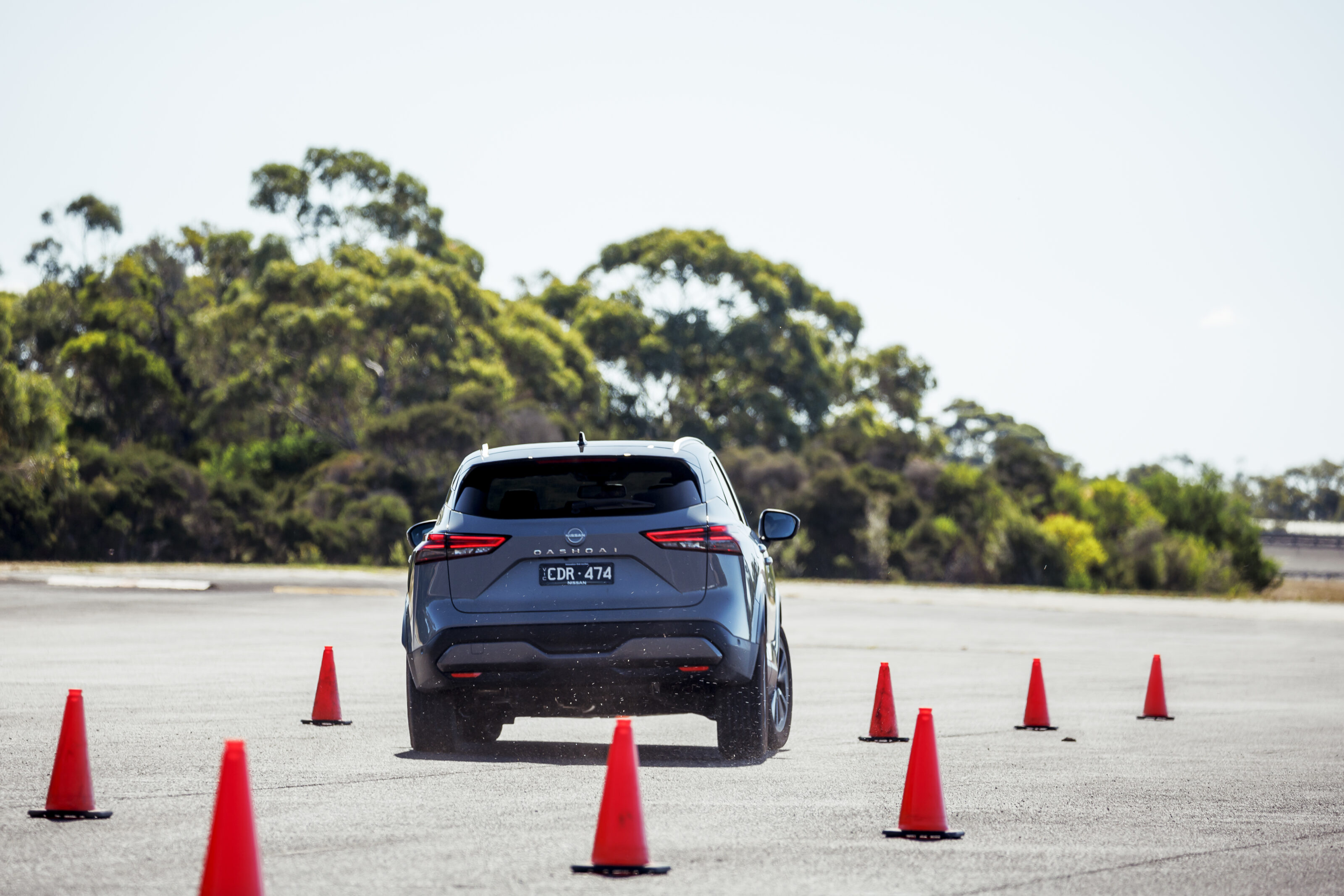
The Qashqai was remarkably agile, able to slice through at speeds up to 95km/h – extremely impressive for a small SUV, as good as a modern sports car. Its pricey Goodyear Eagle F1 tyres (somewhat overkill for a compact passenger SUV) certainly would have helped.
We found the X-Trail was also a strong performer, with the exception of the E-Power variant’s electronic stability control that felt too ‘loose’ for our liking, permitting too much yaw. The vehicle almost spun out with the systems fully activated, multiple times.
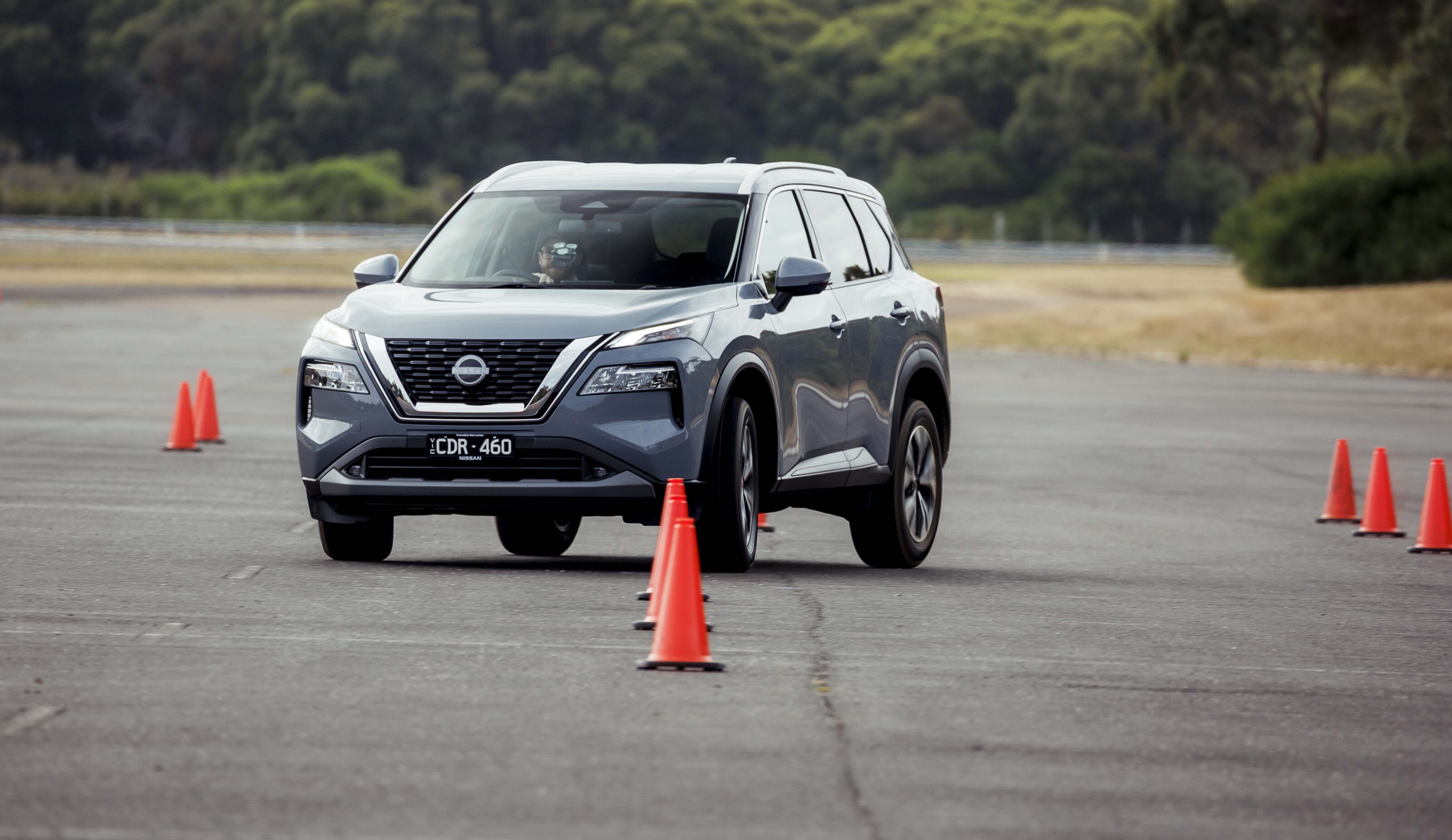
Fuel efficiency
The smaller, lighter Qashqai uses about 20 per cent less fuel than the X-Trail – as you’d hope.
That difference would add up over time, resulting in a fair premium for the extra space and practicality of an X-Trail.
For all its technology, the E-Power’s economy isn’t as great as we would have hoped at 6.1L/100km. A Toyota RAV4 Hybrid uses 4.7L/100km and runs on the cheaper grade 91 RON, whereas the E-Power requires premium 95 RON.
| u00a0 | Qashqai ST+ | X-Trail ST-L 7-Seat | X-Trail Ti-L ePower |
|---|---|---|---|
| Combined (claimed) | 6.1L/100km | 7.8L/100km | 6.1/100km |
| Fuel tank size | 55 litres | 55 litres | 55 litres |
| Estimated range | 900km approx | 700km approx | 900km approx |
| Recommended fuel grade | 95 RON | 95 RON | 95 RON |
Ownership
Both cars come with Nissan’s five-year, unlimited-kilometre warranty which includes five years of complimentary roadside assistance.
The Qashqai must be serviced once a year or every 15,000km – whichever comes first. For the X-Trail, it’s every 12 months or 10,000km. Nissan offers both capped-priced servicing and pre-paid servicing plans for both cars.
Over five years or 75,000km, a Qashqai costs $2916 to service, or you save $290 if buying a five-year prepaid servicing plan up front ($2626).
Front-drive X-Trails cost $2332 to service over five years or 50,000km, all-wheel drives bump that up to $2363 and the E-Power $2353. Up-front five-year pre-paid service plans will save you $233, $239 and $240 respectively.
If you plan on doing lots of kilometres, the Qashqai works out cheaper to service – 0.035c/km versus 0.042c/km for a front-drive X-Trail. It’ll also obviously be cheaper on fuel.
VERDICT
In this pair, Nissan offers two quite different vehicles to suit whatever your specific needs might be.
So, this question matters: How are you using the car?
Only the X-Trail can be had in all-wheel drive, and with seven seats. It’s more spacious inside, can tow more, and is just more practical more of the time – and for only a small price premium. Plus it’s a generally nicer car to drive than the Qashqai, with better-sorted ride and handling.
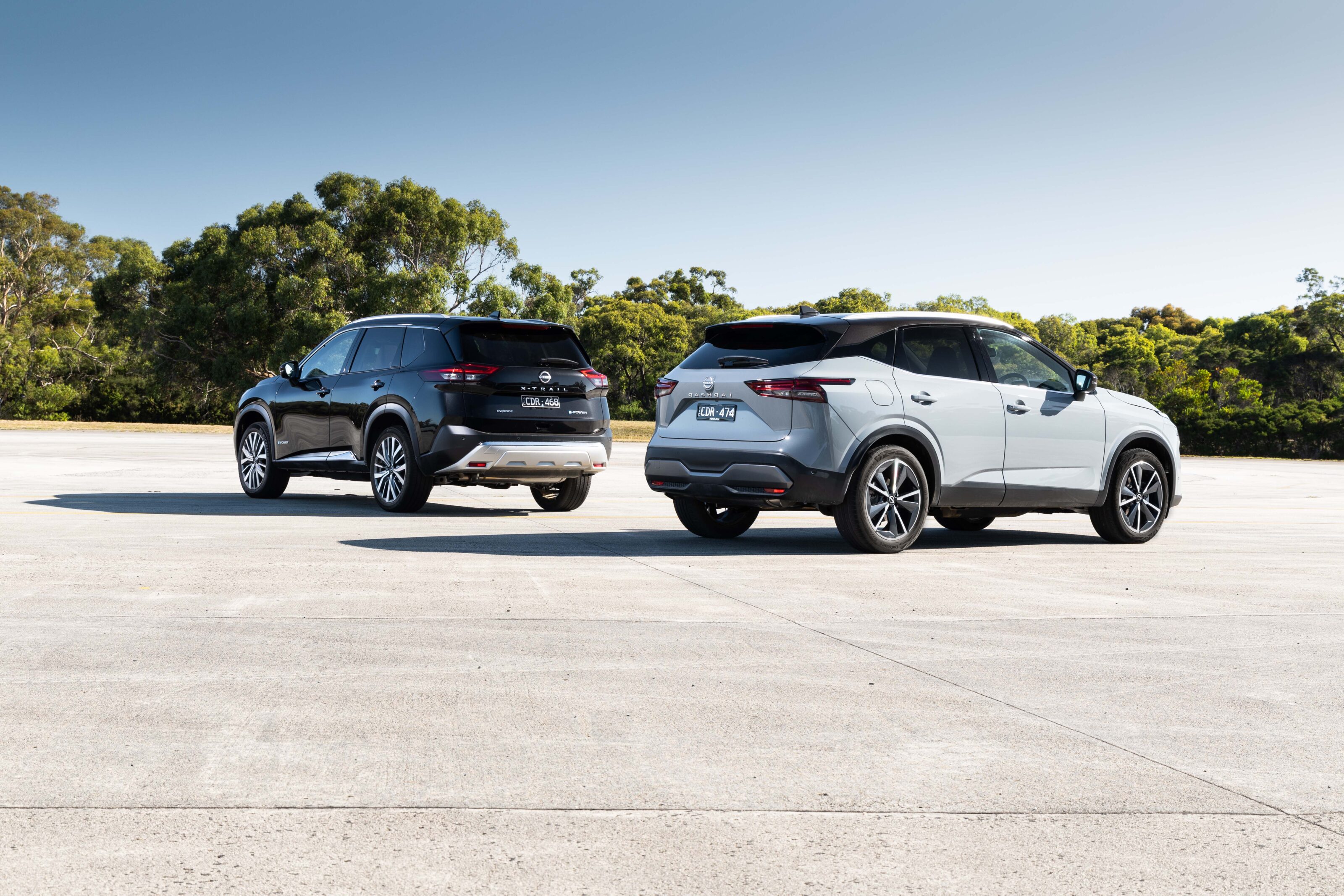
If you’re looking at Ti and Ti-L grades, the E-Power is worth the extra $4200. It’s faster, smoother, quieter and much nicer to drive – even if it’ll take about 125,000km to pay itself off at $2/litre.
However, if you never plan on towing, don’t ever visit the snow, rarely drive on dirt roads and even more rarely have rear-seat passengers, there’s no point paying for the extra capability and space of an X-Trail – get the Qashqai. It offers more equipment for less money and is cheaper to run.
SCORING
Nissan Qashqai: 7.5/10
Things we like
- Luxe interior for the money
Not so much…
- Ride quality could be better
Nissan X-Trail: 8.5/10
Things we like
- All the space you could ever need
Not so much…
- E-Power economy disappointing
Scoring breakdown
| Nissan Qashqai | Nissan X-Trail | |
|---|---|---|
| Safety, value and features | 7 | 8.5 |
| Comfort and space | 8.5 | 9 |
| Engine and gearbox | 7.5 | 7 |
| Ride and handling | 7.5 | 8.5 |
| Technology | 8.5 | 8.5 |
| OVERALL | 7.5 | 8.5 |
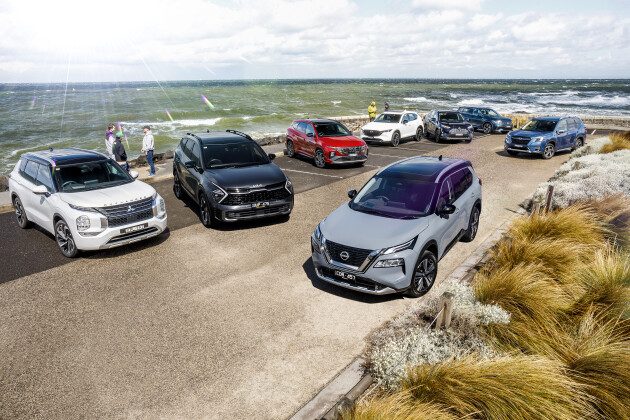
Medium SUV comparison: 2023 Mega Test
Thinking of buying a new mid-size SUV this year? We test eight of the best and most popular contenders to see where you should spend your money
Specifications
| Nissan Qashqai ST+ | Nissan X-Trail ST-L 7 seater | Nissan X-Trail Ti-L E-Power | |
|---|---|---|---|
| Body | 5-door, 5-seat small SUV | 5-door, 7-seat medium SUV | 5-door, 5-seat medium SUV |
| Drive | front-wheel | all-wheel | all-wheel |
| Drivetrain | 1.3-litre turbo-petrol 4-cylinder | 2.5-litre 4cyl petrol | 1.5-litre 3cyl turbo-petrol + twin electric motors & 1.8kWh battery |
| Power | 110kW @ 5500rpm | 135kW @ 6000rpm | 106kW (petrol) + 150/100kW (front/rear e-motors). Combined system output is 157kW |
| Torque | 250Nm @ 1600-3750rpm | 244Nm @ 3600rpm | 250Nm (petrol) + 330Nm/195Nm (front/rear e-motors). Combined system output is 525Nm |
| Transmission | automatic, contioniously variable | automatic, contioniously variable | single-speed automatic |
| Fuel consumption | 6.1L/100km (95 RON) | 7.4L/100km | 6.1L/100km |
| Kerb weight | 1472kg | 1578kg | 1911kg |
| Towing capacity | 1500/750kg | 2000kg | 1650kg |
| 0-100 | N/A | n/a | n/a |
| L/W/H/W-B | 4425/1835/1625/2665mm | 4680/2065/1725/2705mm | 4680/2065/1725/2705mm |
| Suspension | Struts front, multi-link rear | Struts front, multi-link rear | Struts front, multi-link rear |
| Boot space | 429L | 465L | 575L |
| Warranty | 5yr/unlimited km | 5yr/unlimited km | 5yr/unlimited km |
| Safety rating | 5 star ANCAP (2021) | 5 star ANCAP (2021) | 5 star ANCAP (2021) |
| Price | $37,890 (tested $38,590) + on-road costs | $46,290 + on-road costs | $57,190 + on-road costs |
Things we like
- QASHQAI: Luxe interior for the money
- X-TRAIL: All the space you could ever need
Not so much
- QASHQAI: Ride quality could be better
- X-TRAIL: E-Power economy disappointing
We recommend
-
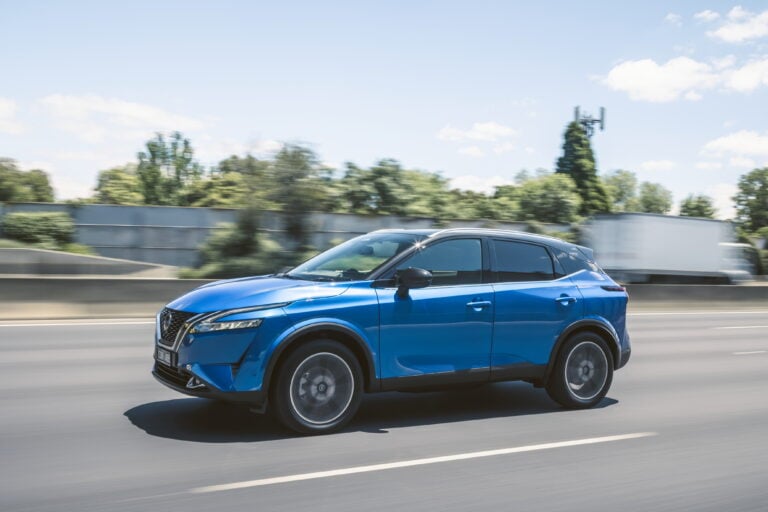 News
News2023 Nissan Qashqai Australian pricing and features confirmed
The all-new Qashqai has landed in Australia and prices are up between $3300-8300 depending on trim
-
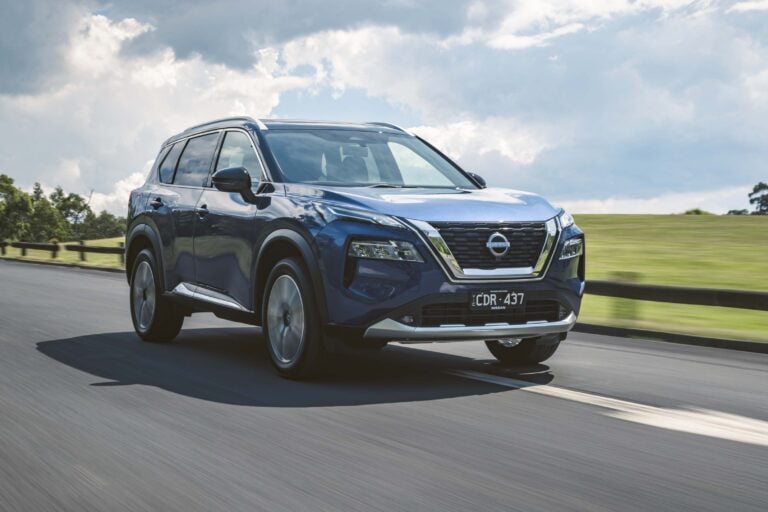 News
News2023 Nissan X-Trail pricing and features
The all-new X-Trail has arrived with four model grades, a host of safety features, and available hybrid power
-
 News
NewsNew car calendar 2026: All the new cars coming to Australia next year
Here’s the WhichCar by Wheels guide to all the new cars that will launch in Australia in 2026. Check back in regularly for updates...


